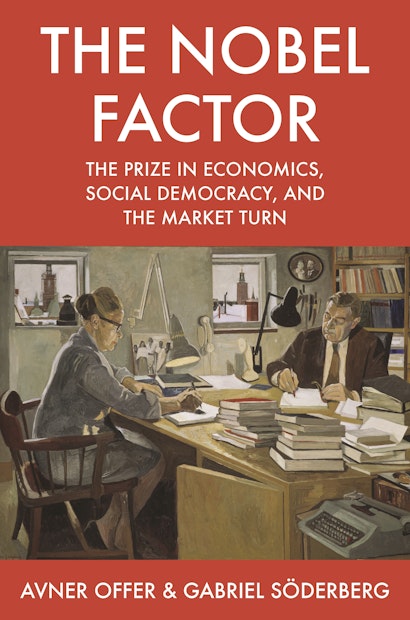Economic theory may be speculative, but its impact is powerful and real. Since the 1970s, it has been closely associated with a sweeping change around the world—the “market turn.” This is what Avner Offer and Gabriel Söderberg call the rise of market liberalism, a movement that, seeking to replace social democracy, holds up buying and selling as the norm for human relations and society. Our confidence in markets comes from economics, and our confidence in economics is underpinned by the Nobel Prize in Economics, which was first awarded in 1969. Was it a coincidence that the market turn and the prize began at the same time? The Nobel Factor, the first book to describe the origins and power of the most important prize in economics, explores this and related questions by examining the history of the prize, the history of economics since the prize began, and the simultaneous struggle between market liberals and social democrats in Sweden, Europe, and the United States.
The Nobel Factor tells how the prize, created by the Swedish central bank, emerged from a conflict between central bank orthodoxy and social democracy. The aim was to use the halo of the Nobel brand to enhance central bank authority and the prestige of market-friendly economics, in order to influence the future of Sweden and the rest of the developed world. And this strategy has worked, with sometimes disastrous results for societies striving to cope with the requirements of economic theory and deregulated markets.
Drawing on previously untapped Swedish national bank archives and providing a unique analysis of the sway of prizewinners, The Nobel Factor offers an unprecedented account of the real-world consequences of economics—and its greatest prize.
Awards and Recognition
- Selected for Bloomberg View’s “The Writing that Shaped Economic Thinking in 2016”
- Selected for Canada’s Financial Post Best Personal Finance and Economics Books of 2016
"Fascinating."—Justin Fox, Bloomberg View
"As intellectual, social, and political history, The Nobel Factor is well worth your time getting stuck into."—Stephen Kinsella, Irish Economy
"This book is hugely persuasive about economics, where the knowledge displayed is extraordinary and the judgments highly persuasive."—Jim Tomlinson, Long Run
"There is much to be commended in The Nobel Factor. The close attention to the history of the Prize in Economics, the careful collection—and correlation—of data on the winners with broader intellectual and political trends makes the book a valuable guide."—Siddharth Singh, Open Magazine
"Authors Avner Offer and Gabriel Soderberg . . . trace the powerful effects of the [Nobel] prize."—Andrew Allentuck, Financial Post
"Through thorough research of the publicly available archives and interviews with participants in the award process, the authors show both ideological and scientific criteria have operated, and, while science ended up lending a hand to ideology, it also sowed the seeds for dissent; scientific criteria drove the prize committee ‘into a refutation of scientific economics.'"—Choice
"Offer and Söderberg's story of the origins, recipients and impact of the Nobel Prize in Economics is intellectual history at its best. . . . The failure of neoliberal economics to predict devastating debt crises and stem destabilising poverty suggests that economics is due for a return to the workbench. This book makes an important contribution to such a rethink."—E. Stina Lyon, Times Higher Education
"Well-informed, trenchant."—Richard N. Cooper, Foreign Affairs
"An important book. It will prove fascinating for all economics junkies, plus those interested in any and all Nobel Prizes."—Walter Block, San Francisco Book Review
"[An] excellent book."—Peter Radford, Real-World Economics Review
"A brisk and persuasive account."—John Driffill, Financial World
"The message of this book—that the fundamentals of economic theory being taught to students and being expounded by economic and political elites needs to be subjected to broader academic critique—is important and well made."—Chris Grocott, Capital and Class
"A valuable history of modern economic thought that takes the unique question of how the establishment of the Swedish National Bank's Prize in Economic Sciences in Memory of Alfred Nobel is related to the history of economic thought. The book is an engaging study that appeals to audiences interested in the nuances of the economic way of thinking and to social science scholars interested in how the Rikbank’s establishment of a Nobel Prize influences the direction of modern economic thought."—Scott Alan Carson, Economics and Political Economy
"In this lively and incisive book, Avner Offer and Gabriel Söderberg explore the prize’s origins in post-war Swedish politics and use it as a lens to examine the ‘market turn’ of the 1970s and the eclipse of social democracy. . . . Immensely ambitious and stimulating."—Peter Sloman, English Historical Review
"Avner Offer, and his younger colleague, Gabriel Söderberg, have written an absorbing, compelling, narrative of the interaction between a sometimes fragile, always arrogant, orthodox economic theory, the [Nobel Memorial Prize in Economic Sciences] and Swedish Social Democracy as a Political Movement. . . . The book richly deserves to be read, its poignant message digested and its valuable contents discussed in as many fora as is feasible, in a topical and timely way."—K. Vela Velupillai, Economia Politica
"The book is at once more nuanced and outspoken, and its authors, Avner Offer and Gabriel Soderberg, deliver its well-articulated message in unexpected ways."—Haro Maas, American Historial Review
"This is a very good book. A good synthesis, in parts a brave synthesis and a book that should have been written long ago."—Ylva Hasselberg, European Journal of History of Economic Thought
"The book raises important questions about the role of honorifics such as prizes in legitimating entire ways of thought, not only for economics but for intellectual life in general."—Kimberly Phillips-Fein, Journal of Social History
"An illuminating and sometimes astonishing book that throws new light on the rise of the new right and the assault on the intellectual underpinning of social democracy. Lateral thinking at its very best—a must-read."—Will Hutton, author of The State We're In
"I love this book. It's beautifully written, but more importantly, it manages to combine a sociology of the Nobel Prize in Economics with a genealogy of market liberalism and a history of Sweden's struggle over social democracy. This is difficult enough to imagine, let alone make work, and the authors should be applauded for doing so."—Mark Blyth, author of Austerity: The History of a Dangerous Idea
"At last, two scholars, profoundly versed in the theory, evidence, and history of contemporary economics, puncture the mythology that is the foundation of free-market neoclassical economics. Economics is not science but one policy voice among many others. As Offer and Söderberg document, the pretense of an objective, scientifically based Nobel Prize in Economics has been an artifice of neoliberal propaganda for decades, doing deliberate damage to social democracy. They give a hearing to all sides, and in the end say it like it is. The influence of economics matters a lot and too much of it is sheer theory without evidence."—Jeff Madrick, author of Seven Bad Ideas: How Mainstream Economists Have Damaged America and the World
"The Nobel Factor is a tour de force account of how the discipline of economics has developed since the 1960s. Using the Nobel Prize in Economics as their prism, Offer and Söderberg present a refreshingly unapologetic, deeply critical analysis of the ideological turn to market fundamentalism that was propelled by the selection of prizewinners. The authors' analysis of the policy implications makes one question whether economics, as it is generally taught, promotes a healthy economy."—Bo Rothstein, University of Oxford
"The Nobel Factor is a fascinating book. It argues that the Nobel Prize in Economics played a role in the transition from social democracy to market liberalism, in both Sweden and the wider world. This is a new idea that should be of wide interest."—Roger E. Backhouse, author of The Puzzle of Modern Economics: Science or Ideology?



